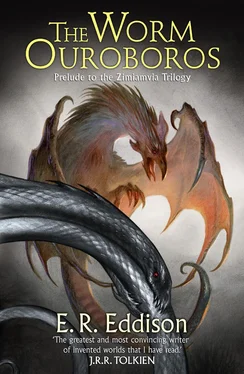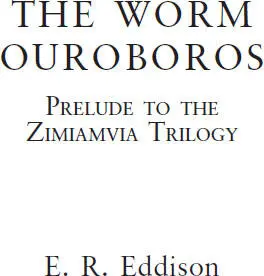A high epic of royal revenge and romance, wizardry and warfare … and a quest that has no end.

Published by HarperCollins Publishers Ltd
77–85 Fulham Palace Road
Hammersmith, London W6 8JB
www.harpercollins.co.uk
Copyright © E. R. Eddison 1922
Jacket illustration by John Howe © HarperCollinsPublishers Ltd. 2014
E.R. Eddison asserts the moral right to be identified as the author of this work
A catalogue copy of this book is available from the British Library.
This novel is entirely a work of fiction. The names, characters and incidents portrayed in it are the work of the author’s imagination. Any resemblance to actual persons, living or dead, events or localities is entirely coincidental.
All rights reserved under International and Pan-American Copyright Conventions. By payment of the required fees, you have been granted the non-exclusive, non-transferable right to access and read the text of this e-book on screen. No part of this text may be reproduced, transmitted, down-loaded, decompiled, reverse engineered, or stored in or introduced into any information storage and retrieval system, in any form or by any means, whether electronic or mechanical, now known or hereinafter invented, without the express written permission of HarperCollins.
Source ISBN: 9780007578115
Ebook Edition © October 2014 ISBN: 9780007578122
Version: 2014-09-09
To W. G. E.
and to my friends K. H. and G. C. L. M.
I dedicate this book
It is neither allegory nor fable but a Story to be read for its own sake.
The proper names I have tried to spell simply. The e in Carcë is long, like that in ‘Phryne’, the o in Krothering short and the accent on that syllable: Corund is accented on the first syllable, Prezmyra on the second, Brandoch Daha on the first and fourth, Gorice on the last syllable, rhyming with ‘thrice’: Corinius rhymes with ‘Flaminius’, Galing with ‘sailing’, La Fireez with ‘desire ease’: ch is always guttural, as in ‘loch’.
E. R. E.
9th January 1922
True Thomas lay on Huntlie bank
A ferlie he spied wi his ee;
And there he saw a Lady bright
Come riding down by the Eildon Tree.
Her skirt was o the grass-green silk,
Her mantle o the velvet fyne,
At ilka tett of her horse’s mane
Hung fifty siller bells and nine.
True Thomas he pulld aff his cap,
And louted low down on his knee:
‘Hail to thee, Mary, Queen of Heaven!
For thy peer on earth could never be.’
‘O no, O no, Thomas,’ she says,
‘That name does not belong to me;
I’m but the Queen of fair Elfland,
That am hither come to visit thee.
‘Harp and carp, Thomas,’ she says,
‘Harp and carp alang wi me.
And if ye dare to kiss my lips,
Sure of your bodie I will be.’
‘Betide me weal, betide me woe,
That weird shall never daunton me.’
Syne he has kissed her rosy lips,
All underneath the Eildon Tree.
THOMAS THE RHYMER
CONTENTS
Cover
Title Page
Copyright
Dedication
Epigraph
Foreword by Douglas E. Winter
Introduction by Orville Prescott
Introduction by James Stephens
THE INDUCTION
I. The Castle of Lord Juss
II. The Wrastling for Demonland
III. The Red Foliot
IV. Conjuring in the Iron Tower
V. King Gorice’s Sending
VI. The Claws of Witchland
VII. Guests of the King in Carcë
VIII. The First Expedition to Impland
IX. Salapanta Hills
X. The Marchlands of the Moruna
XI. The Burg of Eshgrar Ogo
XII. Koshtra Pivrarcha
XIII. Koshtra Belorn
XIV. The Lake of Ravary
XV. Queen Prezmyra
XVI. The Lady Sriva’s Embassage
XVII. The King Flies His Haggard
XVIII. The Murther of Gallandus by Corsus
XIX. Thremnir’s Heugh
XX. King Corinius
XXI. The Parley Before Krothering
XXII. Aurwath and Switchwater
XXIII. The Weird Begun of Ishnain Nemartra
XXIV. A King in Krothering
XXV. Lord Gro and the Lady Mevrian
XXVI. The Battle of Krothering Side
XXVII. The Second Expedition to Impland
XXVIII. Zora Rach Nam Psarrion
XXIX. The Fleet at Muelva
XXX. Tidings of Melikaphkhaz
XXXI. The Demons Before Carcë
XXXII. The Latter End of All the Lords of Witchland
XXXIII. Queen Sophonisba in Galing
ARGUMENT: WITH DATES
BIBLIOGRAPHICAL NOTES ON THE VERSES
Also by E. R. Eddison
About the Publisher
FOREWORD
BY DOUGLAS E. WINTER
‘The Worm Ouroboros, that eateth its own tail …’
I FIRST read these words more than twenty years ago. They seemed magical, an invocation of something locked deep inside me – something dark and dangerous, and yet desperately alive. They intrigue me, uplift me, haunt me, even today; and I introduce them to you with the anxious delight of a child who wishes to share a special secret. You hold in your hands the best single novel of fantasy ever written in the English language.
Eric Rücker Eddison (1882–1945) was a civil servant at the British Board of Trade, sometime Icelandic scholar, devotee of Homer and Sappho, and mountaineer. Although by all accounts a bowler-hatted and proper English gentleman, Eddison was an unmitigated dreamer who, in occasional spare hours over some thirty years, put his dreams to paper. In 1922, just before his fortieth birthday, a small collector’s edition of The Worm Ouroboros was published; larger printings soon followed in both England and America, and a legend of sorts was born. The book was a dark and blood-red jewel of wonder, equal parts spectacle and fantasia, labyrinthine in its intrigue, outlandish in its violence. It was also Mr Eddison’s first novel.
After writing an adventure set in the Viking age, Styrbiorn the Strong (1926), and a translation of Egil’s Saga (1930), Eddison devoted the remainder of his life to the fantastique in a series of novels set, for the most part, in Zimiamvia, the fabled paradise of The Worm Ouroboros. The Zimiamvian books were, in Eddison’s words, ‘written backwards’, and thus published in reverse chronological order of events: Mistress of Mistresses (1935), A Fish Dinner in Memison (1941), and The Mezentian Gate (1958). (The final book was incomplete when Eddison died, but his notes were so thorough that his brother, Colin Eddison, and his friend George R. Hamilton were able to assemble the book for publication.) Although the books are known today as a trilogy, Eddison wrote them as an open-ended series; they may be read and enjoyed alone or in any sequence. Each is a metaphysical adventure, an intricate Chinese puzzle box whose twists and turns reveal ever-encircling vistas of delight and dread.
Eddison’s four great fantasies are linked by the enigmatic character of Edward Lessingham – country gentleman, soldier, statesman, artist, writer, and lover, among other talents – and his Munchausen-like adventures in space … and time. Although he disappears after the early pages of The Worm Ouroboros, Lessingham is central to the books that follow. ‘God knows,’ he tells us, ‘I have dreamed and waked and dreamed till I know not well which is dream and which is true.’ One of the pleasures of reading Eddison is that we, too, are never certain. Perhaps Lessingham is a man of our world; perhaps he is a god; perhaps he is only a dream … or a dream within a dream. And perhaps, just perhaps, he is all of these things, and more.
Читать дальше














